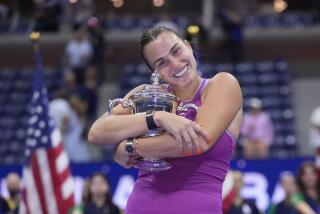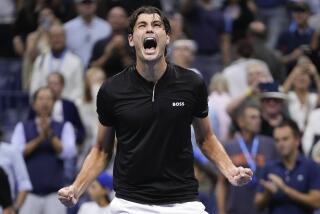Graf, Navratilova Reach a Final Option : Despite Leg Cramps, Steffi Beats Sabatini; Martina Defeats Garrison
- Share via
NEW YORK — Steffi Graf, who does everything in a hurry, set a land speed record (tennis division) for leaving the court Friday at the U.S. Open.
Overcome by painful muscle cramps in her legs just after overcoming Gabriela Sabatini in their semifinal, Graf was gone before you could count 3-6, 6-4, 6-2.
She shook chair umpire Jane Tabor’s hand, dropped her racket on the court and, with her hand covering her mouth, sprinted for the tunnel at midcourt. Waiting there with a microphone was Lesley Visser of CBS, who wanted a quick interview.
Graf gave her a stiff-arm and brushed past the startled Visser.
“And she didn’t even say goodby,” Visser said.
So ended an unusual day in the U.S. Open, where Martina Navratilova had trouble waking up in the first set against Zina Garrison and Graf had trouble putting Sabatini to sleep.
Eventually, both tasks were accomplished. Navratilova, whose 7-6 (7-4), 6-2 victory over Garrison earned some measure of revenge for losing to her last year, will meet Graf for the singles title today.
Two doctors and a trainer who worked on Graf after her match said she should be sufficiently recovered to face Navratilova. Graf, who walked unassisted to the locker room, where she was treated by trainer Leza Hatch, left the grounds without talking to reporters.
“It’s nothing serious with her,” Hatch said.
Dr. Gary Wadler and Dr. Irving Glick, tournament physicians, and Hatch spent 15 minutes with Graf, who drank fluids and had her thighs massaged with ice.
“The cramps subsided,” Hatch said.
Joanne Russell, who is playing in the over-35 competition, was in the locker room when Graf came in. She said Graf was very upset, apparently from the cramps, but calmed down quickly.
“She jumped off the table and said ‘I won,’ ” Russell said.
So did Navratilova, under more conventional circumstances. The only problem she had during her match against Garrison was trying to shake her sleepiness.
“I couldn’t really get going,” Navratilova said. “I had a hard time waking up.”
Garrison’s problem was that she sleepwalked through the tiebreaker. Navratilova double-faulted to give Garrison a point and then watched a lob that fell like a water bomb: 2-1 Garrison.
It was 4-4 when Navratilova closed out the tiebreaker in a hurry. A forehand passing shot, a service winner and a touch backhand volley finished it. Garrison was soon on her way out.
All Navratilova needed was a break in the second game of the second set, which Garrison handed over by double faulting on break point.
Navratilova won in 1 hour 26 minutes, her longest match of the Open. That left Garrison to pinpoint her biggest problem.
“My head,” Garrison said. “I’m going to have to find somebody to totally work on my head. I feel that I’m a champion player, but I have failed to reach my potential.”
The same has been said about Sabatini, who has become the world’s No. 3 player without winning a Grand Slam tournament (Australian, French, Wimbledon or U.S. Open).
In the early going against Graf, it looked as if Sabatini had a chance to get to the final. Graf, who lost her serve three times, was hitting from farther and farther behind the baseline, finding it difficult to measure Sabatini’s topspin.
Sabatini won the first set in 33 minutes, but she began the second set poorly. The problem, she said, was her stamina.
“I ran down a few balls and I think that I was a little bit tired out there,” Sabatini said.
After blowing a break point in the second game, Sabatini lost her serve at 15 in the next game, and that was all Graf needed.
“It’s very hard, because you don’t feel like you have all your energy to keep mentally in the match,” Sabatini said. “That is the hard part. I have to mature a little bit more, in those moments when I’m not feeling well physically.”
Leading in the third set, 3-0, Graf was not feeling well, either. Hatch said Graf told her that is when her leg muscles began aching. Graf flexed her knees between points to keep loose.
Graf still built a 5-2 lead, but during the changeover before serving for the match, she was in real trouble. She did not sit at the changeover, but stood in front of her chair, drinking water.
After spraying cool water on her legs, Graf won her final service game on the second match point with a backhand half-volley winner.
A handshake, a bump and a sprint to the exit later, Graf was off the court and into the final.
Navratilova, 7-5 in matches against Graf, has played her only twice in the last two years, with Graf winning both. The last occasion was the final at Wimbledon, which was a three-set victory for Graf.
A four-time Open champion, Navratilova was asked if she was surprised to be in the final.
“I’m here, aren’t I?” Navratilova said.
Wadler said he thinks Graf will be here today, too, after treating her muscle cramps.
“I would have to categorize this in the relatively mild category,” he said.
U.S. Open Notes
John McEnroe won his first U.S. Open doubles title since 1983, when he teamed with Mark Woodforde to win the men’s doubles championship Friday. McEnroe and Woodforde, seeded seventh, defeated Ken Flach and Robert Seguso, seeded fourth, 6-4, 4-6, 6-3, 6-3. McEnroe’s last Grand Slam title came in the 1984 U.S. Open singles final, when he beat Ivan Lendl. “It’s a nice feeling,” McEnroe said. “I’m not surprised that it is in doubles, but I am surprised that it has been five years. Who knows? This might help me to win other doubles or maybe another singles (Grand Slam title).”. . . So far this year, Stadium Court has been cramped quarters. Steffi Graf became the third player to experience muscle cramps while playing. The others were Jimmy Connors and Jay Berger. The worst attack befell Berger, who had to default his quarterfinal match to Aaron Krickstein in the fourth set. Tournament physician Dr. Gary Wadler said muscle cramps develop because of heat illness due to lack of fluids. “The importance of taking fluids way in advance of a match cannot be overemphasized,” Wadler said. Muscle cramps are not considered an injury, so they cannot be treated by a trainer during a match. Instead, they fall into the category of “loss of conditioning.”
More to Read
Go beyond the scoreboard
Get the latest on L.A.'s teams in the daily Sports Report newsletter.
You may occasionally receive promotional content from the Los Angeles Times.










